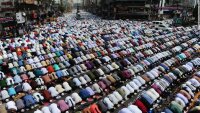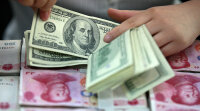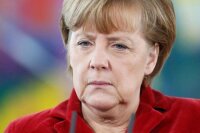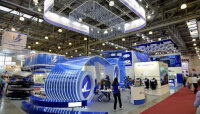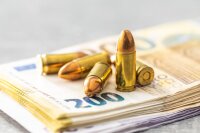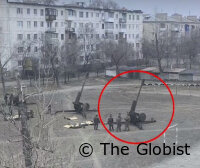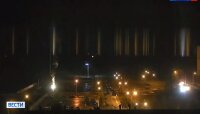Foreign Minister Sergey Lavrov’s interview with Rossiya Segodnya, Moscow, April, 2018
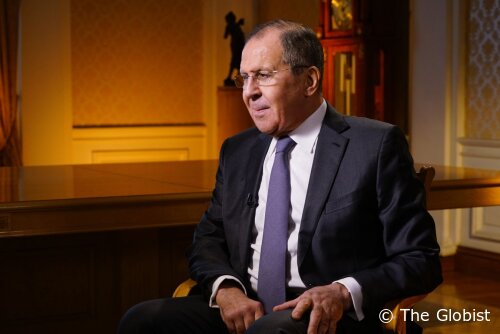
Question: Mr Lavrov, you said that Russia has uncontestable evidence – not “highly likely” as the British like to say, but uncontestable – of the fact that the so-called chemical attack in Douma near Damascus was staged by a country that wants to be in the first ranks of Russophobic nations. This country was later named by Igor Konashenkov, Russian Defence Ministry’s Head of the Department of Information and Mass Communications, who said that it was Great Britain. I believe we are not going to be like the British and will not accuse anyone without having proof. When and what evidence are we ready to present against the UK?
Sergey Lavrov: There is plenty of evidence. Let’s start with the fact that the video that triggered off everything and that was the main pretext for the hectic attack engineered by the Americans, the British and the French, who dropped bombs on the chemical weapons production and storage facilities as they said (I think anyone understands that if you know the location of a chemical weapons depot, bombing it would mean the creation of a humanitarian catastrophe for everybody living nearby), this video clearly shows that people without any protection (except for some people wearing gauze masks) are pouring water on boys and some adults.
Our troops that liberated that part of Eastern Ghouta found two doctors who worked at that hospital. They identified themselves in that video and said that some people broke in and started yelling that it was a chemical attack and everybody must start pouring water on each other. This was an honest claim by doctors who did not hide their faces and who stated their names.
I watched Euronews the other day where I saw a woman whose face and body were covered except for a small slit for her eyes. She would not say her name but she was holding two boys by their hands claiming they were her children who also found themselves in a situation. They suddenly got headaches and smelled something really bad. She started sniffing and did not like the smell either. She finished her statement by saying that her husband took the children to a doctor later. My first question was, can’t you find this doctor and talk to him, find out this woman’s name, about her children and so on? The information we see must be thoroughly analysed, especially now, so that we are not being taken for ‘novichoks’ (‘rookies’)
Also, just recently, our Defence Ministry’s troops liberating Douma found a stockpile of chemicals produced in Germany, Porton Down and Salisbury, among others. Experts are now analysing the substances found there. Moreover, it is not a secret that the scene in the video I mentioned was staged by the White Helmets. And the White Helmets operate only in the areas controlled by militants, including terrorists from Jabhat al-Nusra. They already pulled off a similar provocative scene last year in Khan Shaykhun. It is also no secret that they are funded by the UK, the US and several other Western countries.
We presented all these points very specifically and in great detail at a meeting of the OPCW Executive Council and to the UNSC. In response we have only been hearing that we are trying to blame Britain for some wrongdoings, we are crossing the line; it is impossible to even discuss it because it is not true.
I hope all reasonable people can see the difference between these arguments and the difference between the facts that are put on the table and the facts that are not there at all.
Question: An OPCW expert mission is working in Syria now. What degree of honesty do you expect from their report?
Sergey Lavrov: Sturgeon cannot be half-fresh. If the report is simply honest, that will be enough for us. Of course, it is alarming that a number of players are trying to hinder the OPCW’s activities. We have no doubt that the OPCW experts working in The Hague and on its field missions are top professionals. On the other hand, as previous evidence shows, we cannot rule out the possibility that attempts will be made to use these experts, who are honest scientists, for political purposes. The mission left for Syria and reached Beirut, preparing to cross the Syrian border the next morning. Consular officials from the Syrian Foreign Ministry were waiting to issue them visas. But the mission could not proceed because of the air strikes. Somebody did not want them to reach the area of the alleged chemical attack in due time. They are in Damascus now, and a reconnaissance group has been allowed to enter the site of the alleged attack to see if it is safe for the OPCW experts to travel there. This group was accompanied by UN personnel and protected by the Russian military police. When they were in the relevant area, shooting started from the part of the city where there are still several dozen extremists, who were obviously notified about who was visiting the area and for what purpose.
We are working now to ensure that the OPCW mission does its job properly. In the meantime, our military have found more interesting things at the alleged attack site. In particular, they have found a canister with a chemical substance – I believe it was chlorine – in a flat in a terrorist-controlled district. The canister lay on a very tidy bed. There was no evidence of it entering through the ceiling or the wall. It was most probably brought into the room via the door and laid on the bed. We want to show this and other evidence to the OPCW experts, so that they not only visit the place where the alleged victims were doused with water, but also look at the laboratory where we found toxic agents made in Europe and go to the flat where there is that canister with chlorine. There are many interesting things for them to see there. I hope that they will act as true professionals. We have always been ready to talk professionally with the OPCW and all our Western colleagues.
I have mentioned that our French and American partners asked at an early stage in the ongoing chemical confrontation whether they could send their experts along with ours and the OPCW mission to find out what really happened there. When we agreed to this and said that the Syrian Government would support it, they launched the air strikes instead of using the opportunity offered. So we will see what happens. Of course, we expect honesty from experts, both in Syria and in Salisbury, where the investigation is still underway.
Question: We will discuss the Salisbury incident later on. I have two more questions on Syria. Can experts get hold of any planted evidence, and can someone ask them to take this evidence with them and test it? Is this possible?
Sergey Lavrov: I hope that experts cherish their reputation, and that they will be on their guard. We cannot rule out anything, all the more so as our Western partners are now using below-the-belt methods. I don’t want to rule out anything, but I also don’t want to groundlessly accuse anyone.
Question: And what kind of feeling did you experience when you saw this 11-year-old boy Khasan Diab suddenly surrounded by adults who came down on him and started dousing him with cold water, spraying something into his mouth and intimidating him? This is what his father said. How did you respond to this, on an emotional level, like a human being?
Sergey Lavrov: I felt like Konstantin Stanislavsky, and I wanted to shout: “I don’t believe you!” but, speaking of more subtle human emotions, it is, of course, disgusting that children are used for such dirty purposes.
Question: You have a substantial work record, including at the permanent Russian Mission to the UN. Can you imagine that this boy, Khasan Diab, and his father might show up at the UN Security Council and provide eyewitness accounts of this incident? Or should they obtain Syrian diplomatic passports for this purpose? Will the world hear these people who are key eyewitnesses and participants in these events?
Sergey Lavrov: This would be useful, and, of course, we would support such actions. First of all, the Government of Syria should do this. Our Western colleagues often involve onsite eyewitnesses and civil society members in the UN Security Council’s meetings when there are people who have witnessed any particular situation being examined.
Question: Does such practice exist?
Sergey Lavrov: Yes. They bring in representatives of various NGOs. Over the years, they brought in people from Syria and Iraq (I don’t remember what organisation they represented), and they also organise videoconferences. Technology makes it possible to inform UN Security Council and UN members about the viewpoint of various persons who have witnessed any specific event during open meetings of this top UN body. By the way, we made such efforts in the past and we will continue to insist that onsite eyewitnesses be allowed to address members of the UN Security Council. I am talking not just about Syria , but about other situations as well. But, in this particular case, this is within the Syrian Government’s remit. We would actively support this proposal.
Question: In any case, the boy’s father said they were ready to go anywhere and to testify before anyone.
Sergey Lavrov: Yes, so I have heard.
Question: One way or another, this staged provocation ended with all-out missile strikes that were rebuffed rather effectively. It appears that this is the first such episode in the history of humankind. Did Russia receive a detailed, accurate and timely warning of the impending missile attack? Was Russia able to draw its own “red lines” on the map around certain areas? Was it prepared to respond resolutely if the missiles hit these areas mentioned by us? Was Russia ready to sink enemy ships and to shoot down enemy planes?
Sergey Lavrov: Before the three Western powers’ plans to launch the strikes began to materialise, Chief of the Russian Armed Forces’ General Staff Valery Gerasimov said openly that, if the operations of the so-called “coalition” dealt any damage to Russian service personnel, Russia would retaliate toughly and clearly, and that it would perceive the missiles and their carriers as legitimate targets. This was a clear and unequivocal statement.
By the way, I was surprised to see how our Western colleagues, and mine, too, as well as some of our media came down on our ambassador to Lebanon Alexander Zasypkin, who repeated exactly what our Chief of the General Staff said, whereas they attempted to put words into his mouth to the effect that if at least one missile fired by the coalition flew over Syria, we would start sinking ships, submarines and so on. What was said was a repetition of Chief of the General Staff Valery Gerasimov’s warning about any damage done to Russian military personnel.
After that, there were contacts between military authorities, generals, between our representatives and US coalition commanders. Information was given on where our “red lines” are, including “red lines” on the ground, geographically. The outcome shows that they did not cross those “red lines.”
As for the effectiveness of those strikes, it is also open to question. Our American colleagues claim that all missiles, including the French ones, hit their targets. Our General Staff has a very clear picture: we were following everything in real time, live. We are ready to defend the statistics provided by our military. If anyone insists that all 105 missiles hit their targets, let them come up with their own statistics. At least, our military will, I believe, pretty soon present proof that our statements, our calculations and our arithmetic are not unfounded.
Question: Pretty soon?
Sergey Lavrov: I hope so.
Question: Our military announced that 103 missiles were launched and that 71 of them were shot down. US President Donald Trump said that he phoned someone and asked whether all missiles reached their targets, and the reply at the other end of the line was “every one of them, Mr President”. Who could he have phoned?
Sergey Lavrov: I have no idea who the President of the United States phones in such cases. Our President has no need to phone anyone – they report to him whenever such things happen. I would prefer not to elaborate on mutual relationships inside the American administration and the attitude of certain officials in Washington to the position and instructions of their President.
Question: Will we supply S-300s to Syria?
Sergey Lavrov: President of Russia Vladimir Putin has spoken about this. We are now free from moral obligations. We had them, we promised not to do that around ten years ago – at the request of our well-known partners. We accepted their argument that it might destabilise the situation, although this is a purely defensive weapon, but anyway, we heeded their requests. Today, we have no such moral obligation.
Question: You say you do not want to discuss mutual relationships inside the US Administration, but nevertheless, given the current configuration, when James Mattis “Mad Dog” is the most sensitive “dove” there, the situation looks close to a direct military confrontation between Russia and the United States. How great is the risk?
Sergey Lavrov: I believe US Secretary of Defence James Mattis and Chairman of the Joint Chiefs of Staff Joseph Dunford understand that any actions that can lead to a direct military confrontation between Russia and the US are inadmissible and unacceptable. This is so evident that the military cannot but be aware of this. In fact, they understand this much better than many others.
When politicians try to goad their country’s leaders to more confrontation, including material, it is reckless. They try to achieve their domestic political goals, continue a very harsh fight between the parties (which can be seen in Congress) and actively speculate on the Russian factor, because they see anti-Russian prejudices as the unifying ground. But this campaign is losing steam. It was artificially fed with unprecedented sanctions, because they thought such actions would make us accept their conditions for any further development of relations. This is at the least naïve and short-sighted. What are they saying? They say they want good relations with Russia, but for that to happen Russia must acknowledge all its sins and mistakes. This means they assume they are impeccable and Russia is the only one responsible for everything that is happening now, because it is a rebel and revisionist power trying to break and revise the existing world order. That said, they do not regard the UN Charter as the world order, but what they see necessary to maintain their domination.
I understand that for several centuries the historical West, as we call it, managed all the affairs in the world as it thought fit. And now, when new centres of power arise in Asia, Latin America and, in fact, when the Russian Federation is emerging as one of the most important players on the global stage, they do not like that someone tries to protect their interests. We are not categorical in protecting our interests: we propose searching for a balance of interests in order to come to agreement. Instead they insist that they will negotiate only after we say that we agree with the world order they protect. Actually, this is the gist of the matter.
Speaking about the risks of military confrontation, I am one hundred per cent confident that the military will not allow that. And, of course, neither President of Russia Vladimir Putin nor US President Donald Trump will. They are leaders elected by their people, and they are responsible before their nations for peace and tranquility.
Question: Frankly, I admire the kind of composure and restraint Russia has been showing. I saw the Cold War and I get the impression that if there were a different person in the Kremlin, things could turn out differently, because it looks like there is one provocation after another. Russia is being provoked, but it always refuses to accept this Cold War, this kind of sport. You say this campaign is on the wane, but personally I have the feeling that, on the contrary, it is intensifying. Tension is increasing, blatant lies are becoming an instrument of foreign policy – it is enough to mention British Foreign Secretary Boris Johnson. Our partners do not want to listen or even hear. In my office, I have screens that show Rossiya-24, BBC, and CNN news. Rossiya-24 shows an eleven-year-old boy who involuntarily became an actor in a video, saying he had been given dates, cookies and rice. It would seem this provocation has been exposed, but no – BBC shows the same story to justify the missile strike, matter-of-factly, as if nothing had happened. What needs to happen to ease tensions?
Sergey Lavrov: I did not say this campaign was on the wane. I said it was running out of steam. You know, when a man runs a hundred metres or 10,000 metres, or better 42 kilometres, and with every step he breathes harder, but he goes on running. In the end, his strength just oozes away. It seems to me that we are witnessing a similar process, although they certainly want (I mean those who orchestrate this anti-Russia campaign) to increase their tempo. But this way they might (and most likely will) overtax themselves.
You are absolutely right. I am confident that we need to respond with dignity. We cannot afford to sit back when our property is being confiscated and our diplomats expelled – that would mean we do not respect ourselves. But we are not going to slide into name calling, into squabbling, into rudeness, and we will not do it – it is not the style of our President at all. He always looks to the future and it is very difficult, if not impossible, to throw him off balance. This is what they are trying to do – to unsettle us, shock us out of tranquility, out of confidence, upset our plans at home – we have so much to do here. But I repeat again, when someone yells at you, remember the famous quote: “Jupiter, you are angry, therefore you are wrong.”
Question: Still, as we learned recently, US President Donald Trump has invited Russian President Vladimir Putin to the White House. Are there any details about the timeframe, venue, or agenda?
Sergey Lavrov: We proceed from the fact that US President Donald Trump issued an invitation in a telephone conversation (this is already known, there is no secret). He said that he would be happy to see Vladimir Putin at the White House and meet as part of a reciprocal visit. He returned to the topic a couple of times, so we let our American colleagues know that we do not want to be obtrusive, but we do not want to be impolite either and, given that President Trump was the one to suggest it, we expect him to supply the details.
Question: So is the plan still pending?
Sergey Lavrov: Well, not exactly. The word slipped…
Question: And?
Sergey Lavrov: President Vladimir Putin is ready for such a meeting.
Question: Is it being prepared or not?
Sergey Lavrov: Not yet. When there is any progress, we will let you know. But I must draw your attention to the fact that after this telephone conversation, Donald Trump made several statements in tweets and in words, saying that it was necessary to resolve problems with Russia, that they want to have good relations with us. It is better than not having any, and only fools think otherwise. We hear all this too.
Question: However, Vice President Mike Pence also mentioned that the United States will seek military domination in outer space, including over Russia. Will that lead to an arms race in outer space? How is Russia going to respond?
Sergey Lavrov: The United States has for many years now been the only country blocking the start of the talks initiated by Russia and China at the Conference on Disarmament in Geneva about drafting a treaty on banning the deployment of weapons in outer space. This is not about preventing the militarisation of outer space, because satellites are being launched for military purposes by us and by the Americans, as well as by many other countries. This is a separate discussion. However, deploying weapons in outer space would be very risky and create new and completely unpredictable threats. In conjunction with China, we proposed concluding such a treaty. Everybody is ready to start negotiations. Clearly, it will take a lot of work, but we have a blueprint. It has been thoroughly worked through, and we are open to discussing it article by article and looking for the wording which will make it possible to agree upon it and have it signed. The Americans are the only ones blocking this work. Meanwhile, being fully aware of the danger of such developments, we are waiting for proper conditions to take shape so that we can start talking on a legally binding document. We advance a political concept and call on everyone to declare that each country will not be the first one to take weapons into outer space. There is a UN General Assembly resolution, which we submit. It is approved by a substantial majority of votes. The Americans are against it, and many US allies are abstaining from voting.
However the problem exists. If these threats materialise, we will need to prepare in advance for the actions which will make it possible to avoid the worst-case scenarios, when objects on Earth will simply be destroyed from space. This is a big problem. It includes anti-satellite weapons as well. The sooner such a professional conversation begins with the participation of diplomats and the military at the Conference on Disarmament in Geneva, the better it will be for the entire humanity without exception.
With regard to Vice President Pence’s statement made about the need for the US to assume military domination in outer space, it is not surprising given that the United States refuses to participate in the talks, which I just mentioned. In general, it is customary for the US to strive to dominate everywhere, not just in outer space, but also on land and in the air. They have it written down in their doctrinal documents. So, there’s nothing surprising here. But, I repeat, applying this logic to outer space will, of course, pose a major risk for all humankind.
Question: Well, the Americans haven’t felt the pinch of any restrictions.
Sergey Lavrov: There are no legal restrictions in place.
Question: So, they are simply working on dominating the world. Clearly, Russia should also do so, because there are no restrictions?
Sergey Lavrov: We see what our American colleagues are doing and, of course, we cannot sit on our hands.
Question: Let's return to chemistry, but this time on British soil. How do you like the intriguing BZ agent story? According to the latest reports, we know that the BZ was intentionally added to the samples delivered to a Swiss laboratory in order to allegedly check the level of professionalism and competence of the lab specialists. What is it all about?
Sergey Lavrov: This was done on purpose to test the professionalism of those who were supposed to do the analysis. I’m not going to go into details, since the bulk of the report is confidential, but it is well known that by contacting the OPCW for technical assistance, the British did not just give them a sample of the agent taken at the scene of incident, but told them it was a sample and asked them to find a particular chemical agent in it. In other words, it was an order placed with that lab. Once they were done with this technical function, the OPCW experts confirmed that it was exactly the agent that the British had mentioned to them. However, it was an unadulterated and highly concentrated agent, which means that it was injected into the vial just before the test took place, because otherwise it would have undergone certain metabolic processes over a couple of weeks since the incident and would have a completely different chemical composition.
In parallel, at least in the Swiss laboratory in the town of Spiez, the lab tests of the sample found a certain amount of BZ along with the substance that was ordered, which is listed among Category II agents. According to the Chemical Weapons Convention, it is a less dangerous compound than those included in Category I.
There are many questions involved, and we want to get answers to them. If what we are being told about BZ is true, then we would like to hear clarifications. Now that we have such questions, we would like to see primary test results obtained not only by the laboratory based in Spiez, but also three other laboratories where these samples were sent for testing.
It also transpired that the OPCW experts took samples not at their discretion, but in places indicated by the British.
Question: From the Brits’ hands, actually.
Sergey Lavrov: Yes, from their hands or in their presence. There was no independent medical examination by OPCW experts of the people whose blood samples were given to them. In other words, they relied on the British doctors. It would be a different matter had the British openly showed the results of their investigation after that. But they are keeping everything secret, just as in the case of Alexander Litvinenko in the past. The materials pertaining to it remain confidential to this day.
The number of questions is growing. We have formulated nearly 50 strictly professional questions. In reply, they demand that we respond to their questions first. They only have one, or rather two questions: Was it done on Putin’s orders or has the Russian government lost control of its chemical weapons? Which chemical weapons? The ones we have destroyed and the destruction of which the OPCW has verified to the general approval of the international community?
The Brits have advanced accusations. In particular, one of Theresa May’s officials has sent an open letter to the NATO Secretary General. Why? In this letter, he provides information which, they believe, will convince everyone of the reliability of the British arguments regarding Russia’s guilt. The letter also claims that Russia secretly continued with its chemical weapons programme in the 2000s, and that we destroyed only what we had declared to the OPCW but carried on a secret programme. Somebody later alleged that President Vladimir Putin personally oversaw that programme. If this is so and they had always known about it, why had they not reported their findings to the OPCW? Why had they not raised the alarm and demanded that Russia be called to account? But they remained silent. The letter also says that the method of delivering nerve agents by application to door handles is known to be a Russian idea that has been used for a long time. If they knew about our propensity to put poison on door handles when they accused us of poisoning the Skripals, why did they only think about the door handle three weeks later, after inspecting the taxi, the bench and the restaurant? There is some inconsistency in that. They claim that the Main Intelligence Directorate (GRU) of the Russian General Staff read Yulia Skripal’s emails for years. But you must be able to read her emails as well to say so. The more explanations they offer, the more questions we have.
Question: If they added the incapacitating agent BZ to the samples, which would be taking liberties, the reliability of these samples cannot be verified and the OPCW will be made a fool of?
Sergey Lavrov: I do not claim that they injected [BZ into the samples], that they tried to deceive everyone.
Question: They said themselves that BZ was contained in the control sample.
Sergey Lavrov: Indeed, but we need to check if this is in keeping with the existing quality control procedures. What we do know about the OPCW mission’s trip to the UK at London’s invitation and the way it worked there is not consistent with the very strict procedures that are stipulated in the Chemical Weapons Convention. But we are not accusing anyone. We have asked dozens of questions, and we would like to receive answers to them from grown-up and professional people. We want professional communication. Maybe it will have to wait until there are professionals in the UK government. As of now, communication appears impossible.
Question: It transpires that Sergey Skripal himself chose a slippery way of life but Yulia certainly did not expect this. She came to visit her father to ask for his blessing on her marriage but life took a quite different turn. Now someone writes letters on her behalf in Cambridge English but the person has disappeared. This is a real drama. She is a Russian citizen and she did not plan to stay there. She had just renovated her apartment; she has a fiancé, a dog and her whole life. How can one understand this?
Sergey Lavrov: I consider this simply outrageous. We sent several official notes with the demand to let us make contact with the Russian citizen so that we could make sure that everything that the British say on her behalf is true. For the time being, we have no confidence in this at all. You know, this is transgressing not only ethical but also legal borders. “She does not want to talk to you, this is what she said.” But Yulia Skripal did not say this, we haven’t heard it. She spoke by phone with her cousin Viktoria for a minute and a half. Viktoria mentioned this in her several interviews. She was worried over how Yulia sounded. If Yulia does not want to deal with us, we would like her to tell us this herself. In many cases when our citizens decide to go to another country or get in trouble, and we want to render them consular aid that they reject, we need to be convinced of this during a personal appointment. Let it be just 10 seconds. She will tell us “Thank you very much but I don’t need your services.”
As for Sergey Skripal, you said he chose his road himself. He was convicted and served a prison term for about four years. He was exchanged for what we call the Chapman group – several people who spied for the United States and Britain. The exchange took place and he was released from prison. He moved to his new homeland and led a nice life. If someone in the Russian Federation wanted to get rid of him (we are the only ones that are accused of having a motive), why would we have exchanged him for our intelligence officers?
I have many friends who are intelligence officers and I value my relationships with them and think highly of their profession. Some of our political scientists – let’s call them that – say that it is a noble cause to eliminate defectors. But in reality this is insulting to the intelligence community of any country because they will tell you that if a person was exchanged, he shouldn’t be touched. The question is closed whether he paid for it or not, and all intelligence people know this well.
Question: I am not talking about the need to remove him. He chose his road himself and he chose his partners. Now they are doing with him whatever they want. This is a particular path. Do promises become invalid here?
Sergey Lavrov: Here?
Question: You said that the Douma story is running out of steam to a large extent. What about this case?
Sergey Lavrov: If we analyse how they answer our very concrete questions, dismissing everything as storytelling, and repeating like a mantra that no one else possesses the combination of capabilities needed to produce this substance, that no one else has experience using this substance for illegal purposes, and that no one else has the motives (as Boris Johnson said), then this is complete ignorance of the subject. Over more than a month, they could have asked someone to give them professional background information. The so-called “Novichok”, this classification was not invented by us. It got its name in the West.
True, we did have some research and one of the researchers is Vil Mirzayanov. He emigrated to the United States and published the formula there. The substance was patented, weaponised and used at various US biological and chemical warfare institutions. It is very simple to produce. During a meeting of the OPCW Executive Council, we asked how the laboratory in the town of Spiez was able to determine that it is exactly the substance in question. That means that it had a prototype or a so-called marker. They were reportedly given the formula. For several days, or perhaps hours, that laboratory was synthesising that substance. In other words, it can be easily produced if one has the formula, which was published at the end of the past century. So, it is absolutely unclear why no one can provide this information to the esteemed members of the British Cabinet, including the Prime Minister.
Question: Another widely covered international topic is the upcoming summit of the two Koreas. US President Donald Trump says that he will meet with North Korean leader Kim Jong Un in the coming weeks. A venue is currently being chosen. Russia has proposed holding the summit on its territory.
Sergey Lavrov: I have heard nothing about that. Perhaps, those are someone’s fantasies or suppositions. Some European countries have been mentioned and also Mongolia and a village on the border of the demilitarised zone.
Question: Are we ready to offer our territory?
Sergey Lavrov: I do not think that we should be particularly active in this matter or show any initiative. This is a summit that everyone is looking forward to, because it is a step back from the prospect of a military crisis or a military solution to the Korean Peninsula problem. We hope very much that it will launch the process of de-escalation of tension.
As a matter of fact, less than a year ago, last July, Russia and China put forward the idea of a roadmap. The point was first to stop and begin a dialogue between the two Koreas and between North Korea and the United States and work out some framework that will make it possible to discuss mutual claims and mutual concerns.
We all favour the denuclearisation of the Korean Peninsula, but it can be carried out in different ways. The things we read about current discussions inside the US Administration suggest that quite a lot of people over there wish to do it quickly. I do not think that it can be done quickly, considering what has happened or is happening around the Iranian nuclear programme, when there is a big question mark over the existing agreement. In May, US President Donald Trump will have to confirm that the sanctions remain suspended. If not, then this will mean a withdrawal from the agreement. And so Pyongyang probably looks at this situation and imagines itself in it. It is necessary to press for denuclearisation, yet we must be realists as this is going to be a very hard negotiating process, because in exchange, especially given Iran’s experience, North Korea will demand unbreakable security guarantees. In what form – this remains to be seen. But even that would undoubtedly be a fine solution. I will say again that it would be good, first, to begin dialogue, break the ice during a meeting of the two leaders, and after that very hard work will lie ahead, part of which should include discussions of a broader plan for peace and security mechanisms in Northeast Asia, involving Russia, China and Japan, as was once agreed upon during the six-party talks.
We welcome the upcoming inter-Korean summit, which is due in April, and the upcoming US-North Korean summit scheduled for May-June, as US President Donald Trump said.
Question: You talk about dialogue. Do you not feel old-fashioned in emerging realities? Donald Trump is not coming to this meeting for a dialogue – he is coming with an ultimatum. He already said that if it does not work, he'll get up from the table and leave. What dialogue are you talking about? You seem to have a romantic view of this. I understand this is the noble approach, but how close is it to reality if he talks in ultimatums?
Sergey Lavrov: We cannot start by assuming failure at this meeting. What I think before the beginning of serious talks, you know how boxers take the ring – they weigh themselves and get psyched up, they brag to each other; then they begin the actual fight; and after the fight they embrace and congratulate each other.
I do not want to draw a direct analogy, but raising the stakes before a serious meeting is not news in world diplomacy. We will see.
